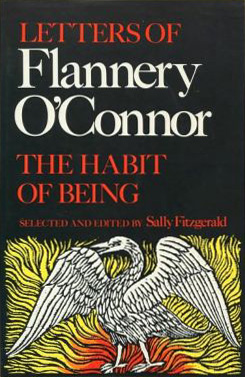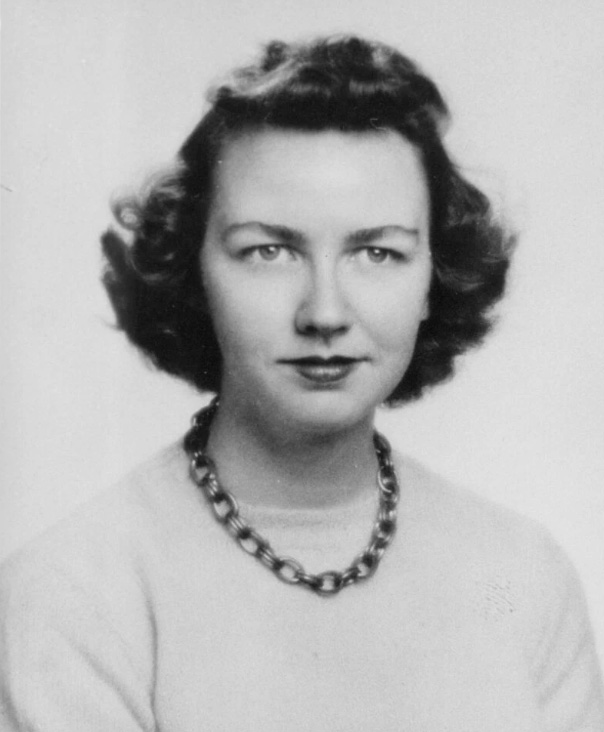Writing for the Godless: Flannery O’Connor on Dogma, Belief, and the Difference Between Religion and Faith
by Maria Popova
“For me a dogma is only a gateway to contemplation and is an instrument of freedom and not of restriction.”
 As humans, we are wired to cling tightly to our beliefs, even the most delusional, and to automatically dismiss conflicting evidence. This is especially true in areas where our beliefs are particularly charged, such as politics and religion. For those of us skeptical of organized religion, who find transcendence in nature and spirituality in science, who fall closer to the atheism end of the belief spectrum, it’s especially challenging to consider perspectives on faith that come from the other end. But something magical happens when we allow the walls of the psyche to soften and become permeable, if only for a moment, to another’s experience of the world — little compares to the self-transcendence that such receptivity invites.
As humans, we are wired to cling tightly to our beliefs, even the most delusional, and to automatically dismiss conflicting evidence. This is especially true in areas where our beliefs are particularly charged, such as politics and religion. For those of us skeptical of organized religion, who find transcendence in nature and spirituality in science, who fall closer to the atheism end of the belief spectrum, it’s especially challenging to consider perspectives on faith that come from the other end. But something magical happens when we allow the walls of the psyche to soften and become permeable, if only for a moment, to another’s experience of the world — little compares to the self-transcendence that such receptivity invites.
One of the most extraordinary meditations on religion and the role of spirituality in society comes from beloved author Flannery O’Connor, whose writing blended her Catholic faith with strong secular themes of ethics and moral philosophy, and nowhere does her singular spirit shine more luminously than in The Habit of Being: Letters of Flannery O’Connor (public library).
In July of 1955, when she was thirty, O’Connor received a letter from a young woman, initially unknown to her, who later chose to remain anonymous upon the publication of the letters. Both hungry for conversation and intrigued by the woman’s intensity of conviction, the author felt compelled to reply, and so began a nine-year epistolary friendship that continued until O’Connor’s death in 1964 from complications due to lupus. The letters to “A.” are among the most extraordinary in the collection, exploring with remarkable dignity and dimensionality matters of faith and religion, the difference between the two, and the role of spirituality in O’Connor’s writing and her personhood.
In her first letter to the young woman, dated July 20, 1955, O’Connor writes:
I am very pleased to have your letter. Perhaps it is even more startling to me to find someone who recognizes my work for what I try to make it than it is for you to find a God-conscious writer near at hand. The distance is 87 miles but I feel the spiritual distance is shorter.I write the way I do because (not though) I am a Catholic. This is a fact and nothing covers it like the bald statement. However, I am a Catholic peculiarly possessed of the modern consciousness, that thing Jung describes as unhistorical, solitary, and guilty. To possess this within the Church is to bear a burden, the necessary burden for the conscious Catholic. It’s to feel the contemporary situation at the ultimate level. I think that the Church is the only thing that is going to make the terrible world we are coming to endurable; the only thing that makes the Church endurable is that it is somehow the body of Christ and that on this we are fed. It seems to be a fact that you have to suffer as much from the Church as for it but if you believe in the divinity of Christ, you have to cherish the world at the same time that you struggle to endure it. This may explain the lack of bitterness in the stories.
Lamenting the triteness of reviews that call A Good Man Is Hard to Find “brutal and sarcastic,” O’Connor wryly notes:
The stories are hard but they are hard because there is nothing harder or less sentimental than Christian realism. I believe that there are many rough beasts now slouching toward Bethlehem to be born and that I have reported the progress of a few of them, and when I see these stories described as horror stories I am always amused because the reviewer always has hold of the wrong horror.
In the next letter, dated August 2, O’Connor apologizes for responding so promptly that it forces a pace beyond her correspondent’s time budget, then arms up the conversation with a similarly sweet and self-deprecating remark about the creative life:
I myself am afflicted with time, as I do not work out on account of an energy-depriving ailment and my work in, being creative, can go on only a few hours a day. I live on a farm and don’t see many people. My avocation is raising peacocks, something that requires everything of the peacock and nothing of me, so time is always at hand.
She then resumes the question of “Christian realism,” about which her correspondent seems to feel particularly strongly:
I believe too that there is only one Reality and that that is the end of it, but the term, “Christian Realism,” has become necessary for me, perhaps in a purely academic way, because I find myself in a world where everybody has his compartment, puts you in yours, shuts the door and departs. One of the awful things about writing when you are a Christian is that for you the ultimate reality is the Incarnation, the present reality is the Incarnation, and nobody believes in the Incarnation; that is, nobody in your audience. My audience are the people who think God is dead. At least these are the people I am conscious of writing for.
In considering the misinterpretation and misapplication of dogma, O’Connor makes an allusion that would later inspire the title of the fantastic posthumous collection of her essays and writings, Mystery and Manners:
Dogma can in no way limit a limitless God. The person outside the Church attaches a different meaning to it than the person in. For me a dogma is only a gateway to contemplation and is an instrument of freedom and not of restriction. It preserves mystery for the human mind. Henry James said the young woman of the future would know nothing of mystery or manners. He had no business to limit it to one sex.
O’Connor has a way of letting her subtle wit slip in through the backdoor of even her most serious convictions:
I won’t ever be able entirely to understand my own work or even my own motivations. It is first of all a gift, but the direction it has taken has been because of the Church in me or the effect of the Church’s teaching, not because of a personal perception or love of God. For you to think this would be possible because of your ignorance of me; for me to think it would be sinful in a high degree. I am not a mystic and I do not lead a holy life. Not that I can claim any interesting or pleasurable sins (my sense of the devil is strong) but I know all about the garden variety, pride, gluttony, envy and sloth, and what is more to the point, my virtues are as timid as my vices. I think sin occasionally brings one closer to God, but not habitual sin and not this petty kind that blocks every small good. A working knowledge of the devil can be very well had from resisting him.However, the individual in the Church is, no matter how worthless himself, a part of the Body of Christ and a participator in the Redemption. There is no blueprint that the Church gives for understanding this. It is a matter of faith and the Church can force no one to believe it. When I ask myself how I know I believe, I have no satisfactory answer at all, no assurance at all, no feeling at all. I can only say with Peter, Lord I believe, help my unbelief. And all I can say about my love of God, is, Lord help me in my lack of it. I distrust pious phrases, particularly when they issue from my mouth. I try militantly never to be affected by the pious language of the faithful but it is always coming out when you least expect it. In contrast to the pious language of the faithful, the liturgy is beautifully flat.
In another letter from a week later, O’Connor writes:
In the face of anyone’s experience, someone like myself who has had almost no experience, must be humble. I will never have the experience of the convert, or of the one who fails to be converted, or even in all probability of the formidable sinner; but your effort not to be seduced by the Church moves me greatly. God permits it for some reason though it is the devil’s greatest work of hallucination. Fr. [Jean] de Menasce told somebody not to come into the Church until he felt it would be an enlargement of his freedom. This is what you are doing and you are right, but do not make your feeling of the voluptuous seductive powers of the Church into a hard shell to protect yourself from her. I suppose it is like marriage, that when you get into it, you find it is the beginning, not the end, of the struggle to make love work.
She adds:
I think most people come to the Church by means the Church does not allow, else there would be no need their getting to her at all. However, this is true inside as well, as the operation of the Church is entirely set up for the sinner; which creates much misunderstanding among the smug.
O’Connor ends with an intimation that not only bespeaks her lucid, intelligent approach to the subject, but also calls to mind Buckminster Fuller’s scientific revision of The Lord’s Prayer with a sentiment that would’ve gladdened Carl Sagan:
I have some long and tall thoughts on the subject of God’s working through nature, but I will not inflict them on you now. I find I have a habit of announcing the obvious in pompous and dogmatic periods. I like to forget that I’m only a storyteller.
The Habit of Being: Letters of Flannery O’Connor is a gorgeous and revelational read in its totality, emanating the timeless beauty of an inner life cut tragically short by an untimely death. Complement it with O’Connor on why the grotesque appeals to us and her little-known satirical cartoons.



No comments:
Post a Comment